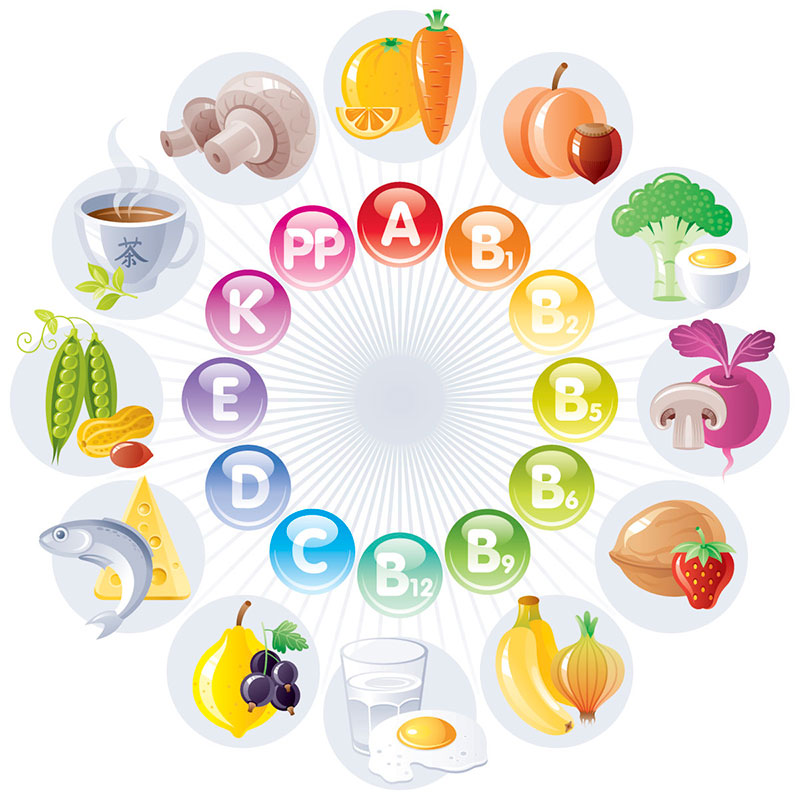Vitamins are trace-amount organic compounds that are essential for normal growth and health of organisms. Vitamins are typically obtained from food or dietary supplements. They are reported to regulate many physiological functions of an organism. These physiological functions involve primarily in catalytic functions (coenzymes), controlling functions (hormone-like substances), and reducing damage from free radicals. Lack of vitamins may lead to deficiency diseases such as circulatory disturbance, metabolic disorder, anemia or muscular atrophy. Therefore, understanding the vitamin content in foods can help consumers better understand and control their daily vitamins intake.
 Figure 1. The vitamin analysis in foods
Figure 1. The vitamin analysis in foods
Lifeasible has an established reputation as a leading provider of vitamin analytical services. We offer accurate and reliable vitamin testing services to food manufacturers and retailers, which are necessary in processing and production to meet specific labeling requirements. By utilizing a comprehensive range of state-of-the-art analytical techniques, our goal is to provide vitamin analytical services with competitive prices and rapid turnaround without sacrificing accuracy. We provide analytical services for both water-soluble and fat-soluble vitamins (Figure1 and Table 1).
Table 1 The types of vitamins
| Water Soluble Vitamins | Fat Soluble Vitamins |
| Vitamin B1 (Thiamine) | Vitamin A (Retinol) |
| Vitamin B2 (Riboflavin) | Pro Vitamin A (ß Carotene) |
| Vitamin B3 (Niacin) | Vitamin D2 (Ergocalciferol) |
| Vitamin PP (Niacinamide) | Vitamin D3 (Cholecalciferol) |
| Vitamin B4 (Choline) | Vitamin E (Tocopherols & Tocotrienols) |
| Vitamin B5 (Pantothenic acid) | Vitamin K1 (Phylloquinone) |
| Vitamin B6 (Pyridoxine) | Vitamin K2 (Menaquinones) |
| Vitamin Bc/B9 (Folic acid) | Vitamin K3 (Menadione) |
| Vitamin B12 (Cyanocobalamin) | |
| Vitamin C (L-Ascorbic acid) | |
| Vitamin C (L-Dehydroascorbic acid ) | |
| Vitamin H (Biotin) |
The commonly used technologies for vitamin analysis in foods are chromatographic, electrophoretic, immunological, spectrophotometric, fluorometric, and microbiological methods.
Many chromatographic methods have been well developed for vitamin analysis. These technologies include liquid chromatography (LC) and its variants, such as high-performance liquid chromatography (HPLC), ultra-high performance liquid chromatography (UHPLC), nano-LC, two-dimensional liquid chromatography (2DLC), and gas chromatography (GC). These chromatographic methods can be coupled with a vast assortment of detectors, for example, ultraviolet/Visible (UV/Vis), fluorescence (FL), electrochemical (EL), mass spectrometry (MS). The versatility of chromatographic methods offers various solutions for dealing with the vitamin characterization of foods.
Capillary electrophoretic (CE) can be used to separate and determine a wide range of water-soluble vitamins in food and beverages. The technique reduces sample pretreatment time and reagent costs. The most commonly used modes of CE in food analysis are capillary zone electrophoresis (CZE) and micellar electrokinetic capillary chromatography (MEKC).
Immunoassays such as enzyme-linked immuno-sorbant assay are reliable methods for vitamin measurement, which have been used for analysis of Vitamin-B12 and Vitamin-D.
The spectrophotometric assay relies on the principle that vitamin can react with a chromogen to cause a color change. The color intensity is proportional to vitamin concentration and can be detected by a spectrophotometer. Spectrophotometric assay is mainly used for determination of Vitamin C.
Fluorometric assay is based on the fact that certain vitamins have the ability to produce fluorescence when reacted with a fluorophore and the fluorescence is directly proportional to vitamin concentration.
Microbiological methods measure the concentration of some micro-organisms, e.g. Lactobacillus casel and Lactobacillus plantoides, whose growth depend upon certain vitamins. A negative control that has no vitamin at all is usually used. Microbiological assays are highly sensitive and specific. They are commonly applied to the analysis of water-soluble vitamins.
The laboratories of Lifeasible are ISO 17025 accredited and overseen by a rigorous quality management system. We employ an international team of highly experienced chemists, microbiologists, and laboratory technicians who operate state-of-the-art equipment. Thus we can provide cost-effective vitamin analysis services compliant with international standards. Our experts are glad to initiate the individual connection with our customers and are pleased to discuss and advise on analytical strategies. In addition to standard tests, we are also developing new versions and upgrating of existing methods to meet future requirements for testing. Please feel free to contact us for more detailed information on vitamin testing.
Lifeasible has established a one-stop service platform for plants. In addition to obtaining customized solutions for plant genetic engineering, customers can also conduct follow-up analysis and research on plants through our analysis platform. The analytical services we provide include but are not limited to the following:
July 13, 2024